![]()
![]()
![]()
![]()
![]()
![]()
![]()
![]()
![]()
![]()
![]()
![]()
![]()
![]()
![]()
![]()
|
|
|
|
|
|
|
|
|
|
|
|
|
|||||||
|
|||||||||
|
|
|
|||||||
March2000 Film Music CD Reviews
|
Film Music Editor: Ian Lace |
|
Return to the March Index with thumbnails [Part 1] [ Part 2] [Part 3]
************************************************************** EDITOR’S CHOICE (Joint with The Bad and the Beautiful) March 2000
**************************************************************
The London Symphony Orchestra conducted by John Williams OST
RHINO/WARNER BROS. R2-75874 (two discs) [75:21/73:41]
Save around 22% with
the retailers listed at the endThis is not a reissue. This is, with 40 minutes of the music omitted from the original 2 LP soundtrack album issued in 1978 (itself a generous 78-minutes) now restored - and much bonus material , this is practically, to all intents and purposes a new release. This is a major event in the history of film music and film music recordings Accordingly we present three five-star reviews from three of our reviewer - The Editor

Jeffrey Wheeler leads with the main review :-
"Now look. The Post: 'It Flies.' The News: 'Look, Ma, No Wires.' The Times: 'Blue Bomb Buzzes Metropolis.' The Planet... I want the name of this flying whatchamacallit to go with The Daily Planet like bacon and eggs, franks and beans, death and taxes, politics and corruption."
Or better yet, like John Williams and "Superman: The Movie."
Like many of his soundtracks from the late 1970s, "Superman" features a balance of familiar musical constructs and nearly continuous melody juggling with a sense of individuality that builds resolutely as the symphony progresses. Williams' technique in the period is less refined than today, but for many Williams buffs those energetic, often glitzy orchestrations mark the apex of his career. His predominately Richard Strauss-like underscore -- at times, overscore -- is a classic; the music is inseparable from the Superman mythos, now as the mythos is slowly becoming inseparable from the music. The Superman fanfares, the Krypton motifs, the love theme, the villains' march, the newly released benign ditty for Clark Kent... these personify the concept of filmusic as what Erich Wolfgang Korngold called "opera without words."
This release offers the original soundtrack recordings in as complete a form as possible. Super new cues include 'Star Ship Escapes' 'Death of Jonathan Kent,' 'The Big Rescue,' 'Crime of the Century,' and 'Misguided Missiles and Kryptonite.' Super expanded tracks such as 'Prelude and Main Title March,' 'The Planet Krypton,' 'Growing Up,' 'The Fortress of Solitude,' 'Super Rescues,' 'Chasing Rockets,' and 'Super Dam and Finding Lois.' Super bonus tracks are the alternate 'The Planet Krypton' and the amusing 'Luthor's Luau,' 'The Flying Sequence' appears with and without Margot Kidder's cutesy recitation, though definitely not super is the pop instrumental 'Can You Read My Mind' (what went through my mind upon hearing it is best left unread). The lists go on.
The production on the release is almost as astronomical. Michael Matessino's good-natured and enthusiastic liner notes diverge immoderately between being remarkably informative to dwelling on inconsequential academics. I also found one error just flipping through the booklet (he writes of 'The Fortress of Solitude,' "...and synthesizer augmenting variations on the two Krypton motifs." Correction: the cue uses a glass harmonica and no synthesizers). A wonderful surplus of graphics, production photographs, and film stills makes up for any insufficiencies in the text. The packaging is difficult to manage, but attractive! Why the super-tight dust sleeves, Rhino? Removing the CD and booklet is like participating in childbirth; it ends with joy, but the exertion leading up to that point... The sound is very good considering the age of the sources, although many will miss the slightly warmer sound of Eric Tomlinson's original mix.
The London Symphony Orchestra is in rebounding shape, faltering occasionally during some tough spots, maybe serving as a comparison for how greatly Williams has grown as a conductor over the years, but is always a pleasure to hear.
If I say I recommend this set it would probably seem redundant. Nonetheless: I recommend this release. The wait is over. Few other powerhouses in the modern canon of music are as genuinely spectacular and efficacious as this one.
Reviewer
Jeffrey Wheeler

And Gary S. Dalkin and Ian Lace add:-
At last, one of the very finest film scores ever penned, complete, and apart from a little distortion and hiss, sounding great. This must stand not just as the album of the month, but one of the greatest film music albums ever issued.
Reviewer
Gary S. Dalkin

Over 40 minutes of material omitted from the original soundtrack album restored. Bliss! At last we have all that magnificent music associated with the Planet Krypton restored, including the never-before-released cue, 'Star Ship Escapes' (with baby Superman). Another first is that moving music for the 'Death of Jonathan Kent' (Glenn Ford) that heightens even further Williams' deeply affecting and noble scoring for the cue, 'Leaving Home.' Additional material rounds out the characters of the villains in such cues as 'Lex Luthor's Lair' and 'Crime of the Century' another new cue that is particularly welcome for its tongue-in-cheek, Tom and Jerry cavortings to accompany the gang's attack on the rocket-carrying convoy. And, incredibly, this is the first time we have had 'The Big Rescue' music for the early stricken helicopter on the skyscraper scene, when Lois murmurs, "You've got me, but whose got you?!".
'Just a minor, cooler note. I also miss the slightly warmer sound of Eric Tomlinson's original mix. It is amazing how one gets used to one recording. My favourite Superman track has always been 'The Fortress of Solitude'. This new album adds much more dynamic material particularly in the early part of that cue before that wonderfully serene and other-worldly, celestial passage towards the end. Interesting as these additions are, in the final analysis it will be the original soundtrack recording that I will turn to for the better more musically satisfying listening experience. It is good to have so many alternatives of 'The Flying Sequence' At last we have the chance to hear it all without Margot Kidder's voice over. But would you believe it, I had kind of got used to her too (except for one or two excruciating phrases in her delivery) so I was grateful to have the original LP cue as a bonus.
But, bliss, bliss. Don't hesitate, open your wallet today before all the copies are snapped up.
Reviewer
Ian Lace

************************************************************** EDITOR’S CHOICE (Joint with Superman - the movie) March 2000
**************************************************************
OST
RHINO/Turner Classic Movies R2 72400 [56:33]
(N.B. This CD was released in 1996)
Save around 22% with
the retailers listed at the end

Does any other composer tell as many entertaining anecdotes about his music as David Raksin? How he came to write his famous Laura melody is the stuff of legends. Add to this Raksin's humorous tale of first playing his theme to The Bad and the Beautiful on the piano for Andre Previn, who was clearly underwhelmed. ("It was confused and confusing," Previn writes in his autobiography, 'No Minor Chords.' "The harmonies tumbled over one another, and themelody was a snake.") Raksin was discouraged, but days later was able to finally record the theme with full orchestra on the MGM soundstage. Previn, who was nearby, overheard the music and rushed up to
congratulate him on such a lovely work. When the rather irritated Raksin pointed out that Previn's reaction to his piano version had been quite opposite just a few days previous, Previn could only respond: "Well ...the way you played it, who could tell?!!"
The story doesn't end there, either. As Raksin tells it in his typically witty liner notes to this Rhino/Turner Classic Movies release of the complete soundtrack, the theme was later rescued from producer John Houseman's rejection by the serendipitous intervention of one of Hollywood's top music and lyric duos. But you can read that part of the story yourself. It's enough to say here that Raksin's sinewy, undulating, entangling main title theme to The Bad and the Beautiful is today considered among the greatest themes ever written for a motion picture. Yes, it's that good, and justifiably that famous. (Check the jazz catalogues to see how many versions have been recorded.)
Made in 1952, the film was a surprisingly honest, often dead-on behind-the-scenes depiction of how Hollywood works, focusing on three stories of a director, a writer and an actress, all of whom are used and discarded by an unethical producer portrayed by Kirk Douglas. Helping Douglas lure them into his schemes is Raksin's main theme which, producer John Houseman told him, needed to be a "siren's song" to make the story work. This CD features three versions of the main title theme -- the second two offered as outtakes at the conclusion of the score. (Raksin varied it yet again for an extended suite he conducted in a marvelous RCA Classic Series LP in 1976. That recording also includes Raksin's Laura and Forever Amber, and is one of the three or four recordings I could happily be stranded with on a desert island.)
Following the main title, Raksin's liner notes lead the listener on a cue-by-cue journey through the film, illustrating music's role in motion-picture storytelling as he goes. It's a bit of a history lesson, too, as Raksin evokes, without repeating them, the cliches of silent movie music, 1940s horror films, and even a tribute to Max Steiner, all encapsulated in a few short cues. One source cue for a newsreel montage deftly turns into underscoring.
But it's that main theme that keeps intriguing the listener. Raksin's variations and developments are brilliant -- the scherzo of the 'Hurry' cue, for example -- and leave an overall effect that is far from the mono-thematic approach that became so popular a decade or solater.
Just over half of the 47 cues on this disc run less than a minute, but the choppiness that's so often inherent in such a format is no bother here, perhaps in part because Raksin's liner notes fuse the music and the story so compellingly. Credit's also due to the people at Turner Classic Movies, for whom this is another in a string of exquisitely detailed film music recordings.
Reviewer
John Huether

Ian Lace adds:-
David Raksin's music for The Bad and the Beautiful is one of my ten all time favourite film scores so I was predisposed to like this original soundtrack album even before it arrived. It perfectly compliments the extended suite that Raksin recorded so superbly in the RCA Classic Film Score series in 1976. (I most heartily agree with John. This recording has to be one of the three or four recordings I could also be happily stranded with on a desert island.)
The presentation is excellent with Raksin's fulsome notes and many stills from the film. I particularly relished hearing, in context, the gorgeous clarinet solo in "The Letdown" which distinguished 'Nocturne' in the RCA recording suite; and all the music associated with Jonathan' s (Kirk Douglas) ruthless romantic manipulation of Georgia (Lana Turner).
It does seem a pity that the original stereo recording (although the film was released with in mono) was lost. This is a mono record from a ¼ inch magnetic tape copy that was, thankfully, made for safekeeping. Nevertheless, this is a classic score and it should be a treasured possession for any film music enthusiast.
Reviewer
Ian Lace

Thomas NEWMAN and Source Music American Beauty .OST
DREAMWORKS 450 210-2 [46:28]
Save around 22% with
the retailers listed at the end
Unless there is another album in the pipeline with considerably more of his material for American Beauty, Thomas Newman's contribution fills less than eight minutes of the running time of this CD. Newman always creates interesting, arresting film music and this score is no exception. His resources are spare and his treatment unusual, if not bizarre.
From the scenes from American Beauty that I have seen in a British TV documentary on the work of its director Sam Mendes, Newman's music seems perfectly attuned to the sense of entrapment experienced by its characters. 'Dead Already' the first of only two tracks by Newman, that opens the album is dominated by a simple motif - da, dada, dada - repeated over and over but with subtle variations to sustain interest and mainly given to a xylophone and guitars over drums and a synth ground that sometimes gives a sense of eerie unease. This track curiously reflects some of what I feel is carefully chosen source music to parallel the characters and plot development, take for instance, the mechanical and restrictive feel of 'Free to Go' from The Folk Implosion.
Thomas Newman's other contribution is the concluding track, 'Any other Name' which is another extraordinary creation. The listener has an eerie feeling of being transported aloft above the clouds, a notion reinforced by the eerie sustained high synth notes and the chill remote piano meanderings. Heavy sustained bass chords give some anchorage - or reinforcement of height - and, at length the piano's seemingly random chords coalesce into something of a tune which one recognises as a variation of the repetitive note sequencing of the opening 'Dead already' cue, but now sounding like some long-forgotten and remote children's nursery song.
The source music includes Peggy Lee singing Bali Ha'I from South Pacific, Elliott Smith's Because, a smoky rendition of 'Open the Door' from Betty Carter, Bobby Darin singing 'Don't Rain on My Parade' and the Free's well known recording of 'All Right Now.' The deadening effect of the curious anarchic and mainly instrumental Cancer for the Cure from Eels seems appropriate.
For only eight minutes of Newman this is certainly not value for money unless you are drawn to the source music and I really do wonder why Newman was favoured this time around but passed over last year for his infinitely better score for The Horse Whisperer?
Reviewer
Ian Lace
Thomas Newman's original music

another view from Mark Hockley
With only two tracks by Thomas Newman to consider, it's almost impossible to recommend this CD, even if you are a die-hard fan of the composer. That's not to say that his contributions are without merit, but is more an objection to this kind of pop compilation masquerading as a legitimate film soundtrack.Even with the inclusion of names like The Who, Free and Peggy Lee, there are very few songs here that generate much enthusiasm. Of course, if you are simply an admirer of the film and want to recapture some of its flavor through the songs, that's fine, but the musical heart and soul of American Beauty must be Newman's score and that is sorely under represented here.
The two items we are rewarded with bookend the CD, with 'Dead Already' kicking things off with a slightly off-centre rhythmic piece, slightly reminiscent of his earlier work on The Player. With its echoing background notes, it nicely sets the tone of disquiet that runs throughout the story.The final track, 'Any Other Name' is a very atmospheric piano based theme and promises much for the complete score. This is subtle, emotional film music similar in vein to some of Mark Isham's work, particularly the outstanding Of Mice And Men.
Although it seems a little unfair to Thomas Newman to give this CD such a low rating, I have to say that in good faith it's very difficult to take any other course of action. My advise would be to hold out for the full score
Reviewer
Mark Hockley

Gabriel YARED The Talented Mr RipleyOST
SONY SK 51337 [63:54]
Save around 22% with
the retailers listed at the end

This album features 7 score tracks by Gabriel Yarded. In addition: 8 new recordings made for the film: classic jazz numbers featuring Guy Barker and various line-ups, one extract from Vivaldi, and one song by performed by Sinéad O'Connor with lyrics by Anthony Minghella. Plus original recordings by Miles Davis: Nature Boy, Dizzy Gillespsie: The Champ, Charlie Parker: Ko-Ko, Marino Marini: Guaglione.
This soundtrack, and of course the film from which it comes, are automatically guaranteed to attract attention if for no other reason that they unite composer Gabriel Yared with director Anthony Minghella for the first time since the enormously successful The English Patient. Yared's Oscar-winning score for that film had some fine passages, but all too often seemed as shapeless and hollow as the drama it accompanied. This was especially noticeable on disc, though some very attractive excerpts appear on The English Patient and Other Arthouse Classics. But then, what was a film musician to do? Yared is a fine composer and his scores tend to match a particular film so well as to work to their detriment away from the screen - his score for Betty Blue is marvellous film music, though rather fragmented away from the images.
Happily, the soundtrack album to The Talented Mr. Ripley is rather more enjoyable, even fun, than any Yared CD I have heard before. The film is a dark drama set against the burgeoning modern jazz scene in 1950's Italy, and there is a lot of warm, sunny, joyful music here as well as the expected romantic elegance. There are actually three aspects to the disc, intermingled to sometimes disconcerting effect.
There are 7 tracks of Gabriel Yared's score. Clarinet and accordion play over strings for the gorgeous 'Italia', a piece of gossamer-dreaminess over all too quickly. The theme is restated more urgently in 'Crazy Tom', and though an Arabic influence appears, anyone listening to Angela's Ashes recently might be forgiven for thinking this was prime John Williams. 'Mischief' heads into understated atmospherics, vibes tying to the jazz flavour of the movie, while 'Proust' is darkly glittering, introducing a secondary theme which forms the basis of the song 'Lullaby for Cain', sung by Sinéad O'Connor over the end titles, but strangely, placed 4th on the album. The song itself is bleakly haunting, and given O'Connor's flair for jazz and torch songs as evidenced by her covers album Am I Not Your Girl? she proves an appropriate choice for the number. Everything comes together in the early morning resignation of 'Syncopes', making Yared's selections here much more attractive than the complete score presented on The English Patient album. In fact in its mournful way this music has the hallmarks of another fine Italian journey into darkness in the tradition of Donaggio's 'Don't Look Now', Mole's 'Othello' and Shearmur's 'The Wings of the Dove'. After this an excerpt from Vivaldi's Sabat Mater (specially recorded for the film) is not the least out of place.
The other two aspects of the album are jazz recordings, old and new. Matt Damon, one of the film's stars, covers 'My Funny Valentine' in Chet Baker style, his slightly flat detachment suiting the mood well. The album closes with John Martyn singing 'You Don't Know What Love', his trademark world-weariness taken to the very limit over the orchestral jazz backing. At the opposite extreme is the foot-tapping, seriously swinging 'Tu Vuo' Fa L'Americano', featuring both Damon, and co-star Jude Law. This is one to play LOUD, and it's sure to put a smile on your face. Elsewhere comes a selection of original jazz classics by the likes of Miles Davis, Charlie Parker and Dizzy Gillespie, in other words, the best in the business. The new jazz tracks all feature Guy Barker and various side-men, and they recreate the sound of 50's jazz with impeccable aplomb.
That all this glues together remarkably well as an album must in large measure be a tribute to Anthony Minghella, for he actually co-produced the new jazz recordings. And this isn't a vanity credit either, for in his very detailed an informative notes we discover that he used to write music himself and is very thoughtful about the roll of music in film, considering that "Music is at the heart of the film..." You might have misgivings about this album, but, and especially if you like jazz as well as orchestral film scoring, it is well worth acquiring. In some ways it covers similar territory, mixing orchestral melancholy with jazz, as Ennio Morricone's hugely acclaimed The Legend of 1900, though for my money, and on disc at least, The Talented Mr. Ripley does it just that little bit better.
Reviewer
Gary S. Dalkin

Save around 22% with
the retailers listed at the end
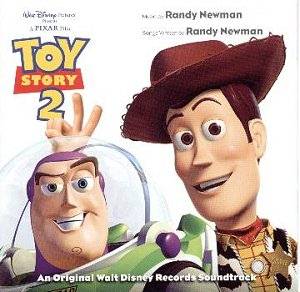
Please read this review in conjunction with that of the accompanying album To Infinity and Beyond - Songs from and Inspired by Toy Story and Toy Story 2 also on this site this month
Randy Newman's light melodic touch so marvellously employed in such films as last year's Pleasantville, seems to have made him the ideal choice for this sequel to the original Toy Story. Here, he delivers a sophisticated score yet one that brims with charm and a child-like sense of awe and wonderment. The difficulty is that although it is brilliant in its primary capacity as music to watch a film, it does not provide a very satisfying listening experience. Whereas there were so many tracks in the Pleasantville score that had clear attractive and well developed themes, Toy Story 2 is too much of a dazzling chiaroscuro, a rich constantly shifting kaleidoscope. I habitually write notes for each track as I review a CD, but on this occasion I found this technique to be unhelpful and well nigh impossible; the pace is so frenetic, the constant mood and tempi changes so fast and furious, even bar-to-bar almost. Take the cue 'Woody's Dream' for instance, within only two or three minutes, you have music that is heroic, romantic and of pathos; you have material recalling Copland (in Rodeo/Red Pony mood); plus influences of Elmer Bernstein and Bernard Herrmann in Vertigo mode. Only very few cues notably 'The Cleaner' allow the score enough time to take breath and present a clear-cut theme - in this case a very appealing and catchy tune. The opening cue 'Zurg's Planet' is another exception which is an amusing parody of all those 'Star Wars' type movies with affectionate references to the music of John Williams and Jerry Goldsmith et al.
I have to say that in this case I found myself rooting more for the three source numbers that introduce the original score. 'Woody's Roundup' a charming song that will appeal to children of all ages sung by Riders in the Sky in the style that we 'oldies' would have associated with Roy Rogers or Gene Autry. 'When she loved me' is an equally old fashioned-style ballad sung with style by Sarah McLachlan and the buddy, buddy song, 'You've Got a Friend in Me' sung with big-hearted conviction by Robert Goulet.
Reviewer
Ian Lace
Rating as music for a family film:

as a listening experience

edel 0107532DNY [46:25]
Save around 22% with
the retailers listed at the end
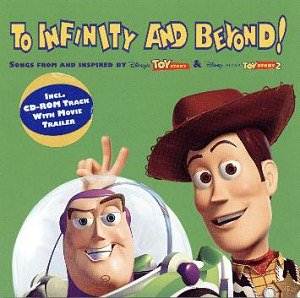
Please read this review in conjunction with that of the accompanying album: Randy NEWMAN Toy Story 2 also on this site this month
I find myself in the unusual position of recommending this album over the main CD of Randy Newman's music for Toy Story 2. It not only has six of the most interesting and substantial orchestral tracks including 'The Cleaner', but it includes many more delightful family-orientated songs and a CD-ROM component. This CD-ROM element is a rib-tickling trailer with at least two hilarious moments: when Woody's horse rears up then squirms with embarrassment when he realises he has revealed too much of himself, and the lovely comment when the Barbie Doll drops into the car beside one of Woody's rescuers - "But I'm a married Spud!"
In addition to the songs I mentioned in my review of Toy Story 2 there is the delightful the Claw scored for organ and tambourine plus male voice and childrens' chorus performed by The Allens. This is a song for those pod-like three-eyed aliens. Another hoot is the 'Pig Rap' - it's a real snort! Composer Randy Newman's husky voice enchants in a number of the songs including 'You've Got A friend in Me', 'Strange Things' and 'I will be Sailing No More' Cadence 2 is another clever song a parody on all those military marching songs, "Sound Off, one two...sound off, three four...", that sort of thing but to a paean of Woody and his plight .
Very warmly recommended. It should keep the kids happy for an hour or two
Reviewer
Ian Lace

Eleven-year old Raya, Ian Lace's step-granddaughter adds:
The Songs: I liked 'When She Loved Me' the best, it was a nicely sung song. Sarah McLachlan has a lovely voice and the words were good. I liked 'The Claw', it was funny but mainly for younger kids but the words were good and so were the voices; a bit repetitive. The 'Pig Rap' was also funny and it had a good beat but it was a bit too short. 'I think I'd be Perfect for You' was nicely sung but it was a bit of a sloppy song. 'You've Got a friend in Me' was sung several times. I liked the more entertaining version by Robert Coulet.
The Orchestral Pieces: I liked 'The Cleaner' best, it sounds more fantasy-like and the tune was good. 'Emperor Zurg' was really exciting and evil. 'Jessie's in Trouble' was very energetic.
The CD-ROM content: The trailers were very funny and exciting and really make you want to see the film
Reviewer
Raya Verrecchia
The Songs:
[variable songs];
The Orchestral pieces:

The CD ROM content

_______________________________________________________________________
Special Gormenghast Feature
CD, Book and Video review
The CD
Richard Rodney BENNETT & John TAVENER Gormenghast
Orchestral score by Richard Rodney Bennett, the BBC Philharmonic conducted by John Harle. Choral music by John Tavener, The Academy of Ancient Music conducted by Paul Goodwin, with The Choir of Temple Church directed by Stephen Layton. Title song sung by Andrew Johnson.
SONY SK89135 [67:20]
Save around 22% with
the retailers listed at the end
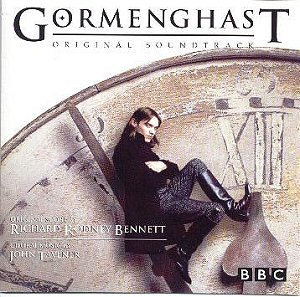
Gormenghast, the BBC adaptation of Titus Groan and Gormenghast, the first two books of an uncompleted sequence of novels by Mervin Peak, is a major television event. Though rather more of an event than it would have been had the BBC not long ago rejected its obligation to a balanced output of drama, including regular, serious, well-made and intelligent adult science fiction and fantasy. Hopefully, Gormenghast marks the beginning of the BBC starting to put things right, though more realistically, it will probably be something the BBC use as an excuse to do nothing else for the next 30 years.
For the moment though, via this lavish gothic fairytale the BBC is taking the fantastical seriously, for which no further evidence is required than to look at the names responsible for the music. Though not prolific, Richard Rodney Bennett is one of our finest film composers, his great score for Far From the Madding Crowd (1967) alone sufficient to rank him with the best. His music is conducted by the composer John Harle, himself a member of the Michael Nyman Orchestra, and who can currently be heard playing the saxophone on the soundtrack of The End of the Affair. The producers managed a further coup in signing one of the most acclaimed and popular contemporary 'classical' composers, John Tavener (which is not to say that Bennett does not also write concert music), to provide four choral pieces. Resolutely committed to the Greek Orthodox interpretation of the Christian faith, for decades virtually all of Tavener's works have been serious religious compositions, so engaging him for a television drama really is an achievement in itself.
Gormenghast is a vast, crumbling castle subject to arcane law and ruled by a detached and eccentric aristocracy. Published in the aftermath of the Second World War, there is clearly a large element of social satire, a commentary on a British Empire in decline looking back to better days. The drama is also informed by a certain orientalism of outlook, Peak having spent his childhood in a remote part of China, though this is more implicit than explicit. Accordingly, Bennett has fashioned a score solidly within the 20th century English classical tradition. Here is confident, imperious music, complete with a very strong main theme and regal fanfares such as aptly describes the imperial and noble nature of Gormenghast. The beautifully crafted and performed title song sets a text from Peak's books. Within this sound world is a rich, sultry musical fantasy, an exoticism which suggests the human desires locked within the monumental architectural and social structures. Inside this, is darkly brooding and inventively suspenseful dramatic writing which calls to mind Bernard Herrmann and his wonderful work for Jane Eyre or The Seventh Voyage of Sinbad and, Journey to the Centre of the Earth, without for a moment ever becoming derivative.
The range of orchestration is dazzling, for gorgeous harp and strings for the opening of 'Ceremony in the Rain', to the glittering panoply of percussion which runs throughout many of the tracks. 'The Death of Swelter' summons visions of John Williams scale epic action writing, while 'Irma's Romance' offers a waltz which may not surpass Bennett's own Murder on the Orient Express, but is certainly a fine companion. 'The Death of Steerpike' is a powerful finale, while the following funeral music and farewell bring the album to a thoroughly satisfying conclusion.
John Tavener's music illustrates the rituals which take-place on screen in various parts of the story. Three are new works, while one is adapted from music the composer wrote for his father's funeral. The arrangements are by Paul Goodwin. The music is characteristic of the composer, eloquent, beautiful, and strange by turns.
The sound throughout is superb, with a detail and clarity befitting a first class classical release, and the performances are magnificent. Television music has been improving immeasurably in recent years, and regardless of carping from certain quarters, Gormenghast is simply one of the finest scores ever written for the medium. The album is generously expansive, but not for a moment does it outstay its welcome, making it an absolutely essential release. Reviewer
Gary S. Dalkin

The Art Book
THE ART OF GORMENGHAST
The Making of a Television Fantasy By Estelle Daniel with a Foreword by Stephen Fry
A BBC Project published by Harper Collins Entertainment 164 pages softback, large format (11 inches x 81/2 inches, portrait) £14:99
Amazon UK £11.99
Save around 22% with
the retailers listed at the end
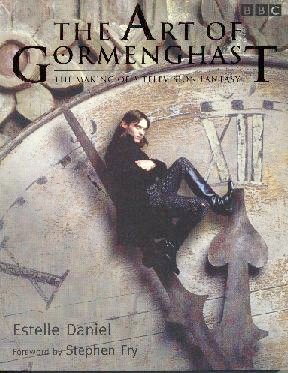
This is a lavish and comprehensive souvenir of an outstanding BBC production.
For many years it was believed that Mevyn Peake's celebrated novels were not suitable for adaptation as screenplays. Indeed, the first thing you see when you open this book is the ironic reproduction of a letter, dated 30th November 1962, to Maeve Gilmore, Mervyn Peake's wife, from the author Graham Greene asserting that Titus Groan, the first novel of the Gormenghast trilogy, could not be filmed!
In an erudite Foreword, Stephen Fry summarises and argues against the objections that were first levelled at the idea of such a project - 'Can't be done... impossible.... Gormenghast is too gothic, gloomy, grotesque... Then we have a useful reminder, a synopsis of the four episodes of the television dramatisation. The concept of the BBC dramatisation and its development is covered before a section devoted to the life of Mervyn Peake and how he came to write his Gormenghast books including a discussion of the influences that guided his creation in both words and pictures. His boyhood life in China and his World War II experiences being major influences.
The art direction is covered in fascinating detail. We learn how Gormenghast was developed visually and how the buildings reflected many architectural styles from European Gothic through Near Eastern structures to the exoticism of Tibet and the Orient. Descriptions of the construction of the sets are included with many revealing illustrations. The costumes are beautifully illustrated with many full page close-ups showing their rich intricate design - the gowns, of Fuschia, Irma Prunesquallor, the identical twins and Lady Groan, based on the fashions of the Elizabethans, are all included. We learn, too, that the design of the tall, eccentrically bent hat of Nannie Slagg was taken from a Spanish gypsy mode from the 1930s.
A full diary of the production is included, so too are a number of story boards of key sequences like: the 'Earling' ceremony; the burning of the library, and the death of Barquentine. There is coverage of the way the animals were handled, the mass of white cats and birds etc; plus the influences that affected Richard Rodney Bennett's musical composition.
There are also many personal contributions, scattered through the book, from the actors who say something of what their roles meant to them and how they approached their interpretation of Mervyn Peake's characters.
A first class production that will be referred to time and again and worth every penny of its £15.
Reviewer
Ian Lace

The Video
GORMENGHAST The Complete Drama in Four Episodes
2 video pack BBC Videos [245 mins]
Save around 22% with
the retailers listed at the end
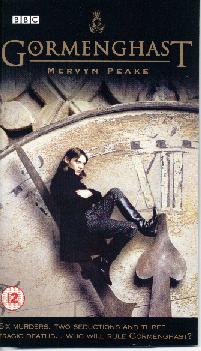
The complete BBC TV production of Gormenghast comes in a two-video package each comprising two episodes. Viewers not only have a wonderful souvenir of an outstanding series, but also the chance to really ogle the wealth of detail that might have escaped them on a first viewing: the sumptuous costumes, the glorious and imaginative sets, the mind-boggling effects, and the superb ensemble acting. But for lovers of film music, repeated viewings of these videos greatly assists in a full appreciation of Richard Rodney Bennett's achievement. Gary Dalkin, in his review of the CD above, has already mentioned the influence of Bernard Herrmann and John Williams but the influence of the English music tradition is even more evident. Walton in ceremonial dress, Cyril Scott's exotic orientalism (befitting the identical twins); and Holst, Vaughan Williams, Warlock and Constant Lambert are all evident. The music used to underscore Lord Groan's tragedy, his loss of his library, and his subsequent descent into madness; and his interaction with the villainous Steerpike and his capricious daughter, Lady Fuschia, is especially noteworthy. This is a telling mix of desolate figures recalling Holst's Egdon Heath, cruel, combative, remote and detached material suggestive of music in Vaughan Williams's 4th and 6th Symphonies and ethereal, other-worldly impressionistic material for the child-like Fuschia. The influence of the impressionists is close too in other parts of the score notably the beautiful and darkly romantic forest music and Ravel's La Valse, recalled in connection with the romantic yearnings of the bumbling bespectacled Irma Prunsquallor. Titus's song, that opens each episode is arresting too, 'Hold Fast to the Law...Hold fast, Gormenghast'; and the weird quivering figures of the Carver's Ceremony together with even weirder bass voice chantings (presumably by Tavener) and heavy oriental gong strokes. Then there are the macabre figures for the hilarious and grotesque duel between Flay and Swelter.
Repeated viewings also help one to appreciate the 'more difficult' choral music contributions from John Tavener, for Titus's Christening, music that resounds with ancient, timeless rituals and the disturbing, edgy material for the Earling ceremony that seems to be full of foreboding and presentiment; and the gentler elegiac but monotonous intoning for poor Fuschia's funeral'
Reviewer
Ian Lace.
James HORNER Bicentennial Man
OST
SONY SK89038 [66:03]
Save around 22% with
the retailers listed at the end
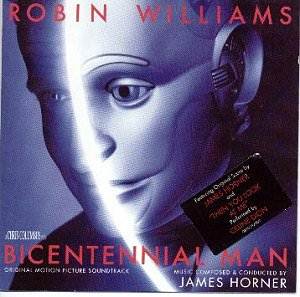
I have to confess I had mixed feelings as I listened to this new Horner score. I was quite impressed with some tracks, bored by others. My idea for a final rating kept fluctuating and I had to fight down my inclination to go for the obvious criticism that, once again, we have rather too much self-quotation.
So let's look at the positive elements first. Once again, I was impressed with Horner's vivid and imaginative orchestrations which bring Robin Williams' robot character to life.
The music in the first two or three tracks is most appealing. 'The Machine Age' is quirky and humorous but highly evocative with its distinctive hammering and riveting sounds. Together with 'Special Delivery' and 'The Magic Spirit', there is an eerie, other-worldliness about Horner's music that is also rather cosy and folksy, and delicate and fragile; and carries, with it, a sense of awe and wonder - all very much at the same time.
'A gift for little miss' adds childish playfulness to stardust wonderment and sentimentality with just a dash of the sinister. 'Transformed' is another sparkling, tinkling track where the men's voices supersede the women's, and attractive little harp and piano figures ripple through the texture. 'A new nervous system' is one of the few upbeat, faster tempo cues; playfully joyful, with attractive pizzicato string variations of the main theme. 'A truer love' has counter melodies in the upper and lower strings indicating the romance; and the tempo picks up to express increasing elation. 'Growing Old' is a more satisfying variation of the sentimental cues that make up much of the remainder of the album.
Now to the downside. Sony seem to think they are doing us a big favour by giving us over an hour of music on many of their sountrack releases. This is fine if the music merits it. This one does not. Firstly, Horner does not present a memorable main theme. Instead, we have material glued together (but expertly and often attractively glued together) frequently based on material he has used before - in Titanic and Legends of the Fall, for instance, interspersed with borrowings from the classics. Clearly, Holst's The Planets comes to mind. Also he seems to be following a trend that is apparently popular now in Hollywood -- the English String Music tradition. This score is heavily string-based; the music is predominantly slow and elegiac. Too many tracks on this album particularly in the middle sound too much alike. I have to be frank when I say I had difficulty keeping awake. At least Elgar, Finzi and Moeran knew how to vary and enrich their writings to maintain their listeners' attention.
The CD ends with Celine Dion's excruciating warblings to even more inane lyrics than for that Titanic song. This time its called "Then You look" - no thanks.
Reviewer
Ian Lace

Gary S. Dalkin adds:
Perhaps I shouldn't be so 'agreeable', but I find myself in concordance with virtually everything Ian says in his review above. This is a long album, for serious concentrated listening, too long. Many of the tracks are indeed similar. Yet I for one don't regret the length of the disc, because it is always easy to programme out certain selections, while as high quality background listening this is a most appealing release. Certainly this is a score that falls within the 20th Century English classical tradition, while adding touches of Hollywood glitter, and it is, at a time when popular music is falling to ever more abysmal depths, gratifying to find real music flourishing and heard by millions. I think perhaps Ian is a little unfair in suggesting that Horner's music fails to keep the interest when compared to Elgar, Finzi and Moeran, as they were writing pure music designed to be the sole focus of attention, not as a subsidiary element to a dramatic production. As film music Horner's score does all that is required of it, and succeeds admirably. Yes, there are echoes of Braveheart, Legends of the Fall and Titanic, but they are not wholesale borrowings and I would class them more as indications of the composer's style, just as the echoes of Close Encounter's of the Third Kind, The Fury and Presumed Innocent which occur in John William's marvellous Angela's Ashes are indicative of his style. Bach and Handel endlessly recycled whole chunks of their music, and we rightly consider them two of the finest composer's who ever lived.
Of course there is a down side. As has become standard practice with James Horner scores, there is a wretched ballad, with idiotic 'lyrics' by Will Jennings, warbled through by the numbing Celine Dion, over a production to rot teeth at a 100 yards. It's enough to give pop music a bad name, and I'm just thankful James Horner wasn't engaged in this practice when he wrote Legends of the Fall. Fortunately there is still over an hour of enjoyable music on the disc.
Reviewer
Gary S. Dalkin

OST Members of the London Philharmonic Orchestra with The London Voices
MAVERICK 9362-47597-2 [43:21]
Save around 22% with
the retailers listed at the end
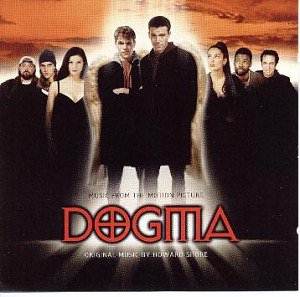
This is the film that apparently outraged the Catholic League although it is more about faith in God than being negative. Described as a comic fantasia, a comedy parable, it is about another round in the eternal fight between good and evil. Angels, demons, apostles and prophets (of a sort) walk among the cynics and innocents of America and contest for the fate of mankind.
For Dogma, Howard Shore's usual action poundings are elevated and given a certain religious majesty and awe and an opposite demonic power - and not without a wry sense of humour. Besides an important role for organ (which in many cues will set your floor-boards shuddering), the orchestral forces are small but unusual yet the sound they deliver is often huge: just three violins, with piano, harpsichord, ondes martenot and cymbalom plus a lot of woodwinds and brass. The first purely orchestral cue 'Dogma' is imposing enough with huge organ swell, tam-tam crashes and a blending of Gregorian chant and other ancient church styles with Rozsa-type biblical music, Orff-like motifs and modern action movie material. The other cues alternate between furious satanic growlings in'The Golgothan' and the frantic chaos of Stygian Triplets in which one senses the beast ids really unleashed, and lighter more 'saintly' material ('The Last Scion'). In 'John Doe Jersey' and the following 'A very relieved deity', the side of righteousness wins and the music becomes ever more heavenly and ecstatic moving through such influences as Holst's Mars, Debussy's Nocturnes and Fauré's Requiem.
The most extraordinary - and the most appealing - track on the album is 'Mooby the Golden Calf', scored for a corporate meeting scene. (I have not seen the film yet.) Mooby is one of the cartoon characters featured in the corporation's magazines and films. The marching song, for children, describes Mooby's character. It's a very catchy number and is slightly reminiscent of Salvation Army material but the children's voices are indistinct so one cannot catch the words; and Mooby being a golden calf one must also assume a possibility of the opposite? Ah well, they always said the devil had the best tunes.
The score opens with another song called 'Still' sung with foggy diction by Alanis Morisette, only the odd word is discernible; it seems to be a collection of paradoxes sung or chanted to music of an Eastern flavour and with instrumentation that includes a sitar.
Unusual
Reviewer
Ian Lace

OST
MILAN 73138 35892-2 [48:06]
Save around 22% with
the retailers listed at the end
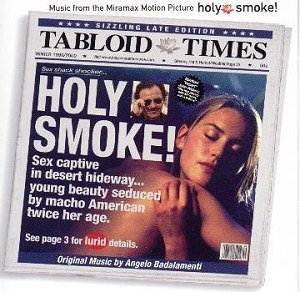
Holy Smoke indeed, for we are led to believe, from the composer's note, that the themes for this score were written, in the company of director, Jane Campion, in two and a half days. Maybe, if they had taken a little more time, they might have recognised that the cue music 'Betrayal of Ruth', that brought tears to Ms Campion's eyes, was perilously close to Henry Mancini's Charade theme. This too-close-for-comfort resemblance certainly inhibited my enjoyment of this score and listening to the first few dirge-like tracks I was of a mind to dismiss this album as a temporary glitch in Badalamenti's upward progress. However the album improved markedly as the cues progressed. 'Waiting, Reaching, Searching', with its persistent three-note motif has more colour and rhythmic flexibility but with an added melancholic lassitude that reminds one of Badalamenti's Twin Peaks music again. 'Kiss All Around It' is an amusing sort of tango triste; and 'Snappy Lipstick' is a snappy catchy jazz number that swings along happily with piano, banjo, whistler. But the most memorable cue is 'The Celebration' native music with alluring and intoxicating rhythms and plenty of exotic drumming. The producers clearly thought they were onto a good thing with this one for it is repeated at the end as a six-minute cue, with the song's title, Maya, Mayi, Ma. This time it is sung by non too convincingly by an unnamed vocalist (Winslett?) who goes on to quote what sounds like Indian religious tracts (?) accompanied by appropriately Indian inflected music.
Completing the disc are three songs from Neil Diamond, The Angels, and 'Primitive' written and sung by Annie Lennox, the latter being by far the best.
Reviewer
Ian Lace

and another view from Mark Hockley
With the front cover of the CD parodying the tabloids with its headline 'Sex captive in desert hideway…young beauty seduced by macho American twice her age', you might have expected something a little more lurid from this score, but Angelo Badalamenti's music couldn't be more different.
As the man himself says on the sleeve-notes, his style might be referred to as 'bitter-sweet' and this is indeed an apt description of the music here.The main theme is introduced in 'Betrayal of Ruth' and is low-key and emotional and can only add a much-needed dimension to the images on screen. This theme continues to develop through tracks like 'Love Journey' and 'Moonrise' and is the mainstay of the entire score and I found myself reminded at times of the work of Georges Delerue (which is certainly no bad thing!). These variations build toward 'Waiting, Reaching, Seeking' which is probably the most satisfying stand alone track on the CD, seeming to best summarize the overall tone and feel.
However, things take an abrupt left-turn with 'Snappy Lipstick', a cheeky, Charleston inspired piece with Honky Tonk piano thrown in for good measure and this certainly comes as something of a surprise after all of the introspective, heart-rending melancholy that has preceded it. But we quickly return to another take on the main theme with 'Hallucination', featuring a soul-searching lone violin.'The Celebration' introduces a triumphant, hopeful element with lyrics and vocals by Chloe Goodchild, which is given a fuller interpretation in the final track 'Maya, Mayi, Ma'. These two pieces at last inject the long anticipated Indian influence that features heavily in the movie, but if I admit that I far preferred the earlier thoughtful melancholia to this celebratory conclusion, that probably says more about me than it does the music itself!
Three songs are also included, Holly Holy by Neil Diamond, The Angels 'I Put a Spell on You' and Primitive from Annie Lennox, but they offer very little and are distracting from the overall tone of the CD.I should also note that there does seem to be some discrepancies in the sleeve notes with tracks 1, 7 and 12 supposed to have lyrics and vocals by Chloe Goodchild and yet her work actually only appears on tracks 11 and 14 . To confuse matters even more, the track listings denote her work as being on 6, 11 and 14!
Although I can't really whole-heartedly recommend Holy Smoke as a purely aural experience, there is certainly enough here to satisfy admirers of the composer and perhaps even win over a few new ones along the way, but I am left with the impression that this is music that needs the images it was written for to truly soar.
Reviewer
Mark Hockley

OST
RCA VICTOR 09026 63592-2 [48:46]
Save around 22% with
the retailers listed at the end

Here is the music from the mildly controversial Mansfield Park, result of the strange ménage à trois of Miramax, BBC Films and The Arts Council. Guess which party were influential in giving the director's chair to self-professed nihilist Patricia Rozema, the Canadian director of I've Heard the Mermaids Singing, and the fascinating The White Room? Guess who promptly added sex to the virginal literary world of Jane Austin, doubtless in a misguided effort to lend the story 'contemporary relevance'. Obviously a modern audience has not the imagination to conceive of romance sans sex, which as we know, hadn't been invented in Austin's time.
The music, by relative newcomer Lesley Barber (previous credits seem to be only for When Night is Falling, Los Locos and A Price Above Rubies), is unlikely to garner much controversy. The main theme is quite captivating, though it takes a few plays to lodge in the memory, and there is much pseudo-Baroque writing that is very pleasant in a light-weight and charming way. Though undemanding, this is a perfectly respectable release, and should make fans of Rachel Portman's Emma content, while even appealing to those who like Michael Nyman's more formally precise scores. I suspect that it is the sort of score that will mean much more having seen the film, and may well grow in stature with subsequent listens. It certainly reveals Lesley Barber as a talent to watch.
All I can say about the last track is, "It's a mystery", which doubtless will be explained by seeing the film itself. Without having done so Salif Keta's song 'Djonga ("Slavery")' seems as bizarrely out of place in this otherwise quintessentially pastoral English world as a Celine Dion ballad would on the end of an historical epic.
Reviewer
Gary S. Dalkin

OST
RCA VICTOR 09026 63580-2 [44:26]
Save around 22% with
the retailers listed at the end
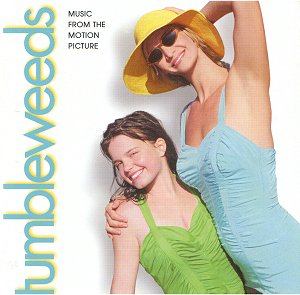
This Tumbleweeds album is occupied, for the most part, by source songs. David Mansfield's score is organised into an 'Intro' track and four short suites with the emphasis on strings with guitar, banjo, mandolin etc, painting the score in American/country music colours. 'Suite #1' contains some energetic string passages, which quickly revert to a quite beautiful theme stated by a solo guitar, discreetly accompanied by a small orchestra. Delicate string themes also appear through the rest of the 'Suites' always performed with adequate sensitivity and polish. In 'Suite #3' agitated string sequences, convey anger and disagreement, later forgiveness and reconciliation in 'Making Up'. 'Suite #4' provides a care-free conclusion to the score with laid-back, mellow strings.
Hardcore filmmusic aficionados may be deterred by the abundance of source songs in this album but they will overlook an otherwise likeable, soothing and relaxing score.
Reviewer
Kostas Anagnostou

OST
SILVA SCREEN FILMCD 322 [47:27]
Save around 22% with
the retailers listed at the end
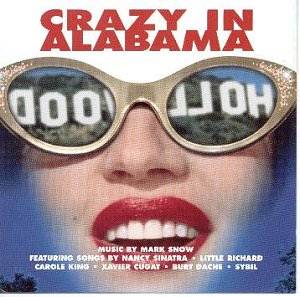
You certainly cannot complain about lack of variety here! This score embraces the sentimental, both trad. and mainstream jazz, some lively source music, and some downright weird synth effects.
The opening 'Pool of Freedom - Theme from Crazy in Alabama' and the End Titles are in the traditional warm-and-sentimental, middle-America, pastoral tradition firmly setting the character and locale of the screenplay. You even hear, within the End titles music, a reference to a theme that Dvorak employed in his 'New World' Symphony. This is attractive, appealing material.
'Mellow Ride' is just that with harmonica, banjo and high strings with an odd interesting woodwind effect now and then. It has a quirkiness that grows on you. This facility of Snow's to create just the right effect is best displayed in the cue, 'Pool Fantasy' an extraordinary eerie evocation that ripples and echoes across the sound stage accompanied with tiny droplets and rattlesnake rattlings and indigenous Indian material. This all segues into a folksy fiddle mourning 'The Death of Taylor'. Later there are more interesting synth effects but in a grotesquely humorous mood in the fast and furious 'Headspin'. Lively trad jazz but with some disturbing breaks infuses 'Faces and Hats' which contrasts with some source mainstream jazz as Xavier Cugat imbibes 'One Mint Julep. Innocence rubs shoulders with the decadent. 'Cell seduction' is slinky, seductive, and jazz-based while 'Fame and Fortune' is all sweet innocence.
Source music includes: Nancy Sinatra singing, 'These Boots are Made for Walking' (I remember that one!); Little Richard's 'Lucille', and Sybil singing 'We Shall Overcome'.
Interestingly, the cues on this soundtrack often seamlessly segue into each other. While not outstanding, this is certainly above the average new score we are sent these days.
Reviewer
Ian Lace

OST
VARÈSE SARABANDE VSD6106 (37:29)
Save around 22% with
the retailers listed at the end
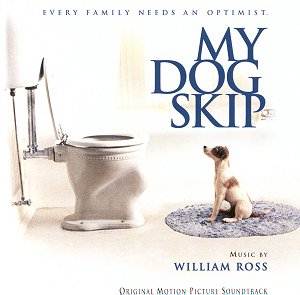
After the his successful T-Rex: back to the Cretaceous, William Ross returns to the family movies genre by scoring this sensitive, coming of age story about the bond between a boy and his dog Skip. Obviously, the movie calls for mellow, delicate and soft themes, and
Williams Ross answers accordingly with this lovely score, based mainly on sentimental and melodic themes on strings and piano.
In general, the score is a medley of well-known styles. The music is quite influenced by Goldsmith, Bruce Broughton, and, occasionally, John Williams It revolves around the main theme, beautifully rendered with piano and strings as the 'Main Title'. The theme binds the score and reappears in varying and more colourful orchestrations. This theme is interweaved with some secondary themes, but none of them sufficiently developed.
Although the main theme is practically never rendered in the same orchestration twice, its repetition begins to become wearisome and it is left to cues like 'Driving with Skip', a fast and jolly track, and 'Greenwood Cemetery', ominous and brassy and quickly reverting to faster-paced music reminiscent of Williams' scores, to barely save the score from being labelled mono-thematic.
Not very original but quite well crafted, this scores nevertheless has enough passion and sentiment but it is standard and predictable for this kind of movie and it demonstrates this promising composer's capabilities in painting emotions in orchestral colours.
Reviewer
Kostas Anagnostou

OST
SILVA SCREEN FILMCD 325 [49:25]
Save around 22% with
the retailers listed at the end
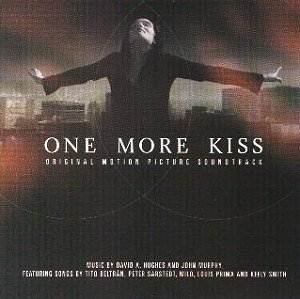
This album certainly has an arresting opening, reflecting the album booklet cover design: the sound of a chill wind clutching at a girl perched atop a New York skyscraper. She observes, "They say the best time to jump is about five o'clock when the wind is low and the traffic won't stop for anybody..."
The blurb tells us that "One More Kiss is a story about rediscovering love and how, when perceptions are forced to change, life can hold an entirely different meaning." Sarah leaves her New York high rise affluence and goes home, to Scotland, to find her old love Sam, now married though, and to visit her father, Frank. But Sarah is under a death sentence of cancer.
Hughes and Murphy's music is perforce romantic and sentimental and tinged with sadness and regret. After the dramatic opening described above, the 'Opening titles' presents, within its 41/2 minute compass, affecting romantic music that is serene yet disturbing and turbulent, and intimate yet remote. A slight tango inflection at one point adds colour. Many of the very brief cues of original music are reflective with slow moving sustained chords mainly for strings. Two cues have special beauty. The oddly named 'Frank's false teeth' that has a lovely haunting poignancy. Seemingly summoning distant memories, this cue has the bass clarinet playing unusually at the top of its register to give a sort of ghostly effect. Then there is the radiantly romantic evocation of 'Kate Flying'.
The source music is interesting and varied. From the world of opera, Tito Beltran sings 'Amor Ti Vieta', Julian Jenson, 'Caruso' and Slava a beautiful arrangement of 'Ave Maria'. Classical popular material includes that marvellous narrative song about the young Parisian lady with airs, 'Where do you go to my lovely'; and 'How About You' (better known by its line 'I love New York in June, how about you') which is chosen by Sarah to be sung at her funeral.
One or two of the original music tracks have narrative overlain. Particularly poignant is Sarah's 'Last Speech', "It's pointless you mourning for me, I enjoyed my life. Naturally you'll miss me - I have a great sense of humour...think of me at a better party." The music at this point has warmth and compassion and is, rightly, just that little bit remote with some nice material for the oboe.
A feel-good album to be taken with chocolates and plenty of Kleenex.
Reviewer
Ian Lace

But Paul Tonks is sceptical:-
Yikes! What the Hell kind of concept is this? Although I suspect only the best of intentions, this is almost a template for what not to do in putting a soundtrack album together. Every conceivable target audience group is going to feel short-changed. Blatant rip-offs, classic pieces thrown in at random, a mish-mash of songs, dialogue, 30 second cues, and a complete absence of the title song. Let's take those in turn:
We start with a dangerously close plagiarisation of Craig Armstrong's "Weather Storm" (from his The Space Between Us solo album) in "Opening Titles". There's a couple of classical cinematic chestnuts in "Ave Maria" and "Beautiful Dreamer", then a hodgepodge of styles cocktailed together in Connie Lush's "Fascinating You" & "How About You?", Milo's "Swimmers", and Peter Sarstedt's "Where Do You Go To My Lovely?"
The film dialogue chosen is hardly anything memorable, and is wastefully mixed into the music beneath which makes programming impossible. Length of cues may only be a personal bugbear, but surely a little editing might have produced a semblance of musical growth? Lastly is the fact the film title is inspired by the song "One More Kiss, Dear" sung by Don Percival in Vangelis' Bladerunner score. All the booklet has to say is that it isn't included. Presumably the explanation comes under a licensing wrangle - but an explanation would have been nice.
Despite the obvious cameraderie in collusion between those involved, there is no pleasing result to be made from the sum of their parts.
Reviewer
Paul Tonks

 |
Search the Crotchet database below |
| Discs
on these pages are offered for sale. There is also a page of search
engines from a selection of on-line retailers
here.
Please support this web-site by buying your discs here. Disclaimer: Every effort is made to make sales links to the correct disc but, in the end, you must take responsibility for checking that what you are purchasing is what you want. Some of these discs were not actually available for sale at the time of posting but a link has been made in anticipation of their forthcoming availablility. |
Return To Film Music on the Web
e-mail: info@musicweb.uk.net